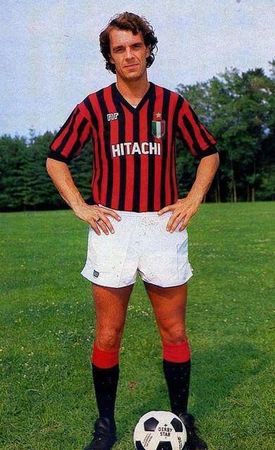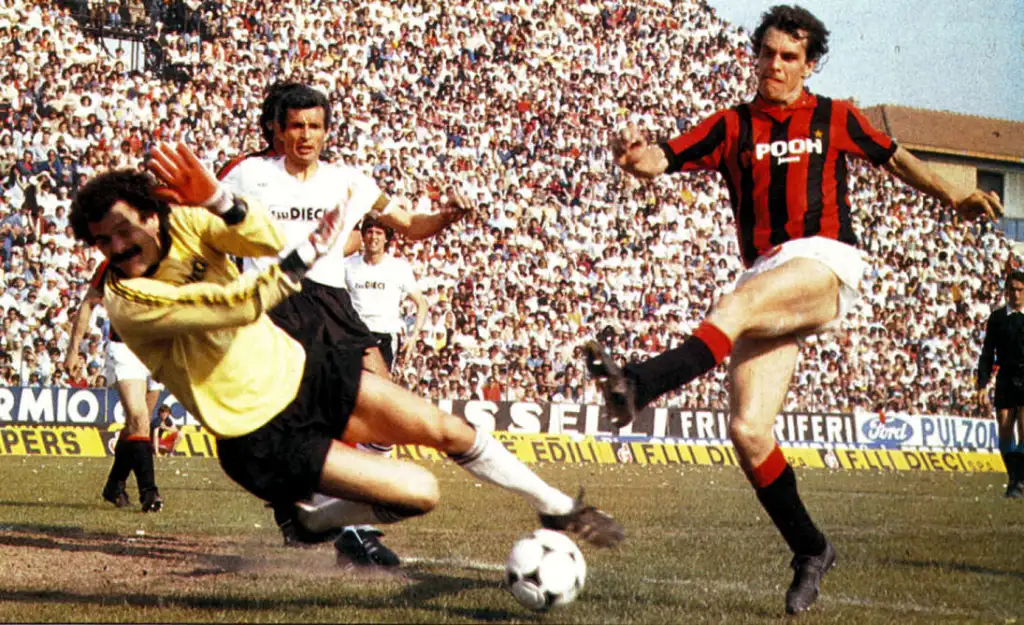“The Italians have their ways, but as long as you know what they are like, you are fine.”
Joe Jordan’s advice on the Italian ‘stile di vita‘
 Jordan played for Milan between 1981-83
Jordan played for Milan between 1981-83
In 1975, under the tenure of renowned English manager Don Revie, Leeds United reached their one and only European Cup final. Leading Revie’s front-line against Bayern Munich that night was a plucky Scotsman by the name of Joe Jordan. The Yorkshire club succumbed to a 2-0 defeat, but Jordan had impressed the Bavarian giants, who consequently tabled an offer for the Scot. Despite Jordan’s pleas, Leeds refused to sell, but his mind was made up; at some point during his career, he wanted to move abroad.Six years later – during his spell at Manchester United – AC Milan came knocking. It was not in Jordan’s psyche to allow something, or someone, to thwart his ambitions twice.
Having already scored in two World Cups (1974 and 1978), the Scottish international arrived at San Siro in 1981 with quite a reputation. But as the Italians quickly discovered, this wasn’t just based on his goal-scoring attributes.
Jordan was a product of his era. He was stoic, wholehearted and at times rambunctious. Early in his Leeds career, he lost four front teeth playing in a reserve match. The outcome was a freakish smile, earning him the nickname ‘Jaws’. This all added to Jordan’s fearsome reputation and an Italian equivalent of his moniker was swiftly embraced. Milan now had a penalty box predator in their ranks; ‘Lo Squalo‘ – ‘The Shark’.
Yet Jordan had the skill and cunning to match his rugged persona, and for a man who stood at 5 ft 9, his heading ability was particularly impressive. After a stuttering start in Rossoneri colours, it was this aerial prowess which helped him become a fan-favourite overnight.
It was a Coppa Italia game and more importantly, Jordan’s first taste of the Milan Derby. With the sides drawing 1-1 and the Diavolo needing a win to progress, the Brit seized his opportunity. Jordan leaped above a static Inter defence and powered an accurate header into the bottom corner. The delivery from the free-kick was average, but the finish was devastating. Unfortunately for Jordan and his teammates, Inter equalised and Milan were eliminated, but the Scot still cherishes the memory.
“I scored against hated rivals Inter in one of my first games, which saw me mobbed by fans. The stadium was full, it was a night match and a fantastic experience. It’s one of the biggest games that I’ve ever played in.”
While Jordan thought this would be the start of “an Italian dream”, the reality was rather different. Having been relegated a year prior to his arrival due to their involvement in the Totonero betting scandal, the Rossoneri’s return to Serie A proved transient. Consistently poor results saw Milan slide back down to Serie B and their struggles were mirrored by Jordan, who scored just two goals in 22 games.
With the club at its lowest ebb, Lo Squalo’s time with the Rossoneri looked to be drawing to a rather meek close. Few players who had experienced the glamour of scoring in World Cups, or competing in a European Cup final, would relish the prospect of playing in Serie B – a league nicknamed purgatorio.
Jordan, however, was a stalwart character, and if the Diavolo had to endure the fire and brimstone of purgatory, he was determined to suffer it with them. In many ways, by doing so the Scotsman set a precedent for the likes of David Trezeguet, Pavel Nedved, Gigi Buffon and Alessandro Del Piero, who all stayed loyal to Juventus after the club suffered relegation in 2006 for their part in the Calciopoli scandal.
Of course, as all the aforementioned players would discover, life in Serie B was more guts than glory. Every game was a battle and Jordan was the perfect man to lead the Rossoneri line. His bullish commitment – even against Serie B’s minnows – endeared him to the hordes on San Siro’s Curva Sud, and he finished the season with 10 goals in 30 league appearances. More importantly, he helped the Diavolo in their quest for redemption.
Yet this would prove to be the end of Jordan’s Milanese adventure and in the summer of 1983, he exchanged the vogue of Milan for the romance of Verona. His resolute performances in Serie B had attracted the attention of Hellas, a team with lofty ambitions and European status.
On paper, the move was perfect. The former Leeds man was acquired to partner one of Maurizio Iorio or Giuseppe Galidersi, whose burgeoning talents were thought to be the perfect foil for Jordan’s experience and grit. Unfortunately, a successful partnership never materialised, and after registering only two goals at the Gialloblu, Jordan was jettisoned in favour of youthful exuberance, eventually returning to England at the end of the season.
Despite an unspectacular end to his career on the peninsula, Jordan feels great reverence for Italy. In 2011, when Tottenham Hotspur were drawn against Milan in the Champions League, the then assistant coach of Spurs spoke nostalgically about the Italian way of life.
“It was a better way of living,”Jordan admitted. “I’d come from a working-class background in Scotland and I was playing in a dressing room of Italians who all seemed well educated and cultured – it was difficult for me, but I loved the Italian culture, the cafes, restaurants and museums.”
The consequent tie between the Rossoneri and Tottenham became infamous for a visceral side-line quarrel between Jordan and Gennaro Gattuso. Gattuso, nicknamed ‘Ringhio’ (Growl) during his career, might have done well to remember he was squaring up to a man with his own menacing epithet. Indeed, the Italian tabloids were quick to point out that Gattuso’s growl was rather feeble in comparison to ‘Lo Squalo’s‘ bite.
In the past, many British players have struggled to adapt to the mores of the Italian game. Jordan, on the other hand, was enchanted by the challenges and experiences it offered. “It was the best move of my career,” he later reflected, “Italian football, I quickly discovered, was hard, intense and beautiful at the same time.”
This whole-hearted embrace of the peninsula and its football is precisely why the story of Joe ‘Lo Squalo‘ Jordan was a success – and in its own peculiar way, typically Italian.

